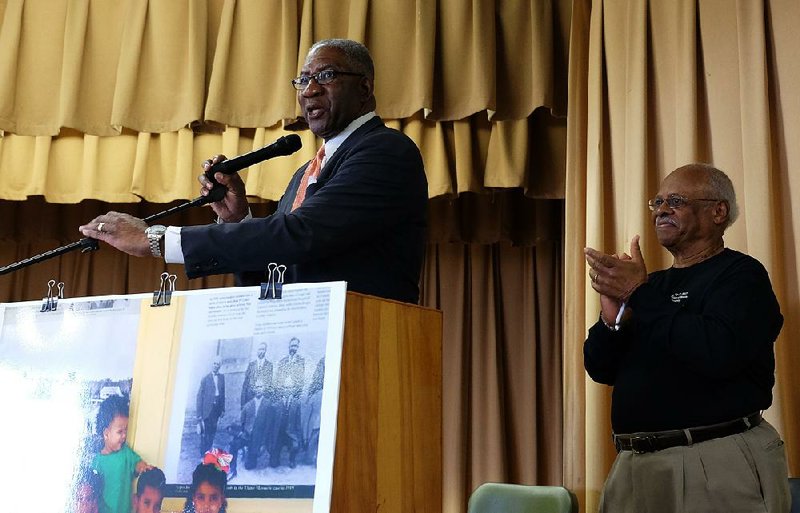ELAINE -- On the eve of the 94th anniversary of the ruling that added protections for black people in the criminal-justice system, a preacher spoke of the virtues of remembering.
On Friday, Pulaski County Circuit Judge Wendell Griffen took off his legal hat and took on his preacher's role, calling attention to the little-known Elaine massacre of 1919 in which hundreds of black sharecroppers were slain at the hands of white landowners.
"Don't ever underestimate the power of being good and brave," Griffen said. "Elaine reminds us that we who believe in justice must not be lulled into a sense of complacency. We can't think that we've gotten so far from where we used to be that we don't have to think about the way folks always are."
"You cannot allow the passage of time to let you feel comfortable."
The massacre led to one of two lawsuits by the NAACP that resulted in the U.S. Supreme Court decision in Moore v. Dempsey, which helped ensure black defendants received due process. Sunday marks the decision's 94th anniversary. Griffen's speech was part of a weekend of activities in Elaine related to the anniversary.
On Sept. 30, 1919, about 100 unionized black sharecroppers gathered in the now-vanished Hoop Spur community -- 3 miles north of Elaine -- to talk about fair wages. A confrontation with white landowners led to violence in which one white man was fatally shot.
Racial and labor tensions were rising across the country at the time.
The morning after the violence, the Phillips County sheriff led a militia of up to 1,000 armed men to quell the unrest. With the assistance of hundreds of military troops sent by Gov. Charles Hillman Brough, white mobs commenced a "slaughter," Arkansas historian Grif Stockley writes in his book Blood in Their Eyes.
Around 285 people were arrested, and historians estimate that around 250 were killed, though those numbers are still disputed today.
Days later, six black men -- Frank Moore, Frank and Ed Hicks, Joe Knox, Paul Hall and Ed Coleman -- were tried on murder charges in state court. Their trials lasted no longer than an hour, and all six were sentenced to death.
Little Rock attorney Scipio Jones, backed by the NAACP, appealed the six men's verdicts, saying the trials violated the due-process clause of the 14th Amendment, which guarantees the right to a fair trial.
The Arkansas Supreme Court denied the appeals and they went to the U.S. Supreme Court. The federal justices decided 6-2 that the men's trials had been tainted with mob violence, and that due process had not been afforded in their convictions and death sentences.
By November 1923, Gov. Thomas McRae commuted the death sentences, and the men were freed two years later.
"I think of the Elaine race massacre when I think of Michael Brown Jr.," Griffen said. "I think of the Elaine race massacre when I think of Trayvon Martin. I think of the Elaine race massacre when I think of Sandra Bland. I think of the Elaine race massacre when I think of Philando Castile. I think of the Elaine race massacre every time I hear the words Black Lives Matter. And I think of the Elaine race massacre when I see news reports that law enforcement officers are going around the country picking up immigrants and throwing them in jail and blocking them from the country."
Griffen was referring to the deaths of mostly black men at the hands of whites.
One of the six Moore defendants, Ed Coleman, still has relatives in Phillips County. His great-great-grandson, Steven Bradley -- a child nutrition director at the KIPP Delta Schools in Helena-West Helena and a spokesman for the Memphis Black Lives Matter chapter -- spoke about how he uses the legacy of his ancestor to give power to his own life.
"My grandfather, my great-grandfather, they kept telling me, 'remember the ones who came before you. We're standing on the shoulders of great men and great women -- people who stood up for us to have great education,'" Bradley said. "My father and my mother and my grandfather, they don't have an eighth-grade education between them. I hold five degrees, and I'm fixing to get a Ph.D in the next nine months, but only because I remembered what they went through. I carry it with me every day."
Johnny White, 65, of Helena-West Helena spoke of his great-grandfather Roby Smith, born in 1892, who was paid $1 a day to wheelbarrow bodies of the massacred into railroad boxcars after the 1919 killings.
"It was the most money he had ever made in his life," White said. "He wouldn't talk about it to a whole lot of folks, just the family."
Today, White searches for the burial site of all those killed.
To Griffen, the massacre and lawsuit largely have been ignored. The omission of the Elaine events in mainstream history is "a calculated indifference of powerful people who would have the ability to shed light on it."
"I think we have to hold our leadership accountable for not shedding light on what happened here. And I think we need to not saddle the people of Elaine with the total responsibility from making known the importance of what happened here," he said. "Elaine is a forerunner to Central [High School]. Elaine is a forerunner to the Black Lives Matter movement, and if we are to be faithful to history we have to give Elaine its proper place."
Slowly, however, the events of 1919 have become better known, locally and across the state. In October, a group of Elaine residents together with statewide advocates opened Turning Point Park. It was the first commemoration of the massacre that's been largely forgotten over the past century.
Metro on 02/18/2017
